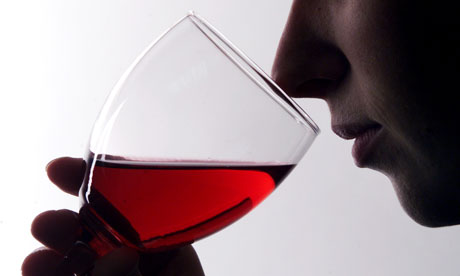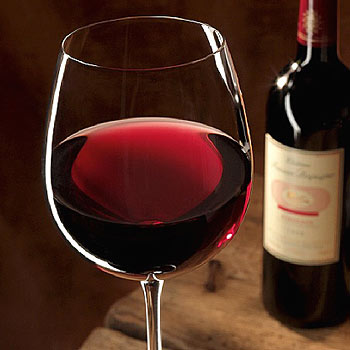When it comes to health, wine wins over beer
The battle being fought in laboratories and tasting rooms around the world is between beer drinkers and wine drinkers.
Each side claims that their drink is the best, arguing over everything from taste to overall “classiness” of their libation of choice. Given that beer and wine are the two most popular alcoholic drinks in the U.S., it’s safe to say that each drink has certain merits.
However, there is one area in which wine has a clear advantage, and that is when it comes to your health. While no one is suggesting that wine is a health food, or that someone who doesn’t drink at all should take up imbibing vino just for the health of it, when consumed in moderation, wine does offer some clear benefits for our health that beer doe not.
Wine is good for your heart
While a Danish study in 2000 indicated that all forms of alcohol can lower the risk of heart disease, thanks to its ability to increase HDL cholesterol and hence reduce the thickening and hardening of the arteries, red wine was shown to be the most effective in preventing heart disease. Researchers chalk this up to the fact that red wine (and white wine, to a much lesser extent) contains tannin procyanin. This antioxidant encourages cell growth while also preventing plaque build-up in the arteries and reduces the risk of stroke and other serious heart problems. In fact, this antioxidant is believed to the be the explanation for the so called “French paradox,” the fact that the French have lower rates of heart disease than people from other countries, despite diets that tend to be high in fat and cholesterol.
That’s not to say that beer does not offer any heart benefits. A 2001 study indicated that beer does contain heart-healthy amounts of vitamin B6, which reduces the amount of the heart-disease causing amino acid homocysteine in the blood. However, this limited benefit pales in comparison to the proven and powerful benefits of red wine.
Beer contains natural antioxidants: phenolics (similar to some found in red wine) and compounds known as melanoidins, formed when barley or malt is heated and which give very characteristic colours and flavours to beers. But does a beer have the protective effects associated with moderate intake of red wine?
Population studies in beer-drinking communities of Australia and the Czech Republic have linked moderate beer drinking with reduced risk of heart disease.
In Dubbo, Australia, a ten-year study of nearly 3,000 men and women born before 1930 found that compared to non-drinkers, those who had a beer or two each day had almost a 20 pc lower risk of dying from heart disease.
And a recent study by Dr Martin Bobak of the Department of Epidemiology and Public Health, University College London, and colleagues, among male beer drinkers in the Czech Republic, found that men with the lowest risk of having a heart attack tended to drink daily and imbibed 4-9 litres (7-15 pints) of beer per week.
A regular beer intake has also been linked to reduced risk of kidney stones in a study of the dietary habits of Danish men. All wines are produced from fermented fruit juice - grape juice is most commonly used. White wine is made by fermenting the juice alone, while red wine uses the skins and seeds (the colour comes from the skins).
Champagne and sparkling wine involve a second fermentation in the bottle, trapping carbon dioxide to produce the bubbles.
Wine contains small amounts of minerals and B vitamins (but less than in beer). Compared to white, red wine contains more potassium, iron and antioxidant phenolics. The concentration of phenolics can vary according to the grapes used and where they are grown.
Lower risk of cancer
 While red wine may be best known for reducing the risk of heart disease, it’s also beneficial in reducing the risk of certain types of cancer. Researchers chalk this up to the fact that red wine contains the flavonoid resveratrol, which is believed to help improve cell growth and block the development of tumour cells. Beer contains some antioxidants, but does not offer the same cancer-fighting properties as wine.
While red wine may be best known for reducing the risk of heart disease, it’s also beneficial in reducing the risk of certain types of cancer. Researchers chalk this up to the fact that red wine contains the flavonoid resveratrol, which is believed to help improve cell growth and block the development of tumour cells. Beer contains some antioxidants, but does not offer the same cancer-fighting properties as wine.
Wine equals lower weight: In moderation
There’s a reason that you don’t ever hear of anyone complaining about having a “wine belly”: In general, wine is far lower in calories than beer. The fact that one glass (about six ounces) of wine has fewer calories than an equivalent amount of beer helps wine drinkers maintain a healthy weight more easily compared to beer drinkers.
In fact, several studies have also indicated that wine drinkers tend to have healthier lifestyles than beer drinkers overall. One 2006 study in Denmark even tracked the grocery purchases of wine drinkers as compared to beer drinkers and found that those who chose wine tend to buy more fresh produce and lean meats, as opposed to beer drinkers who purchased processed and junk foods.
The recent publication from the Copenhagen Centre for Prospective Population Studies followed the drinking habits of 24,000 men and women for 20 to 30 years and concluded that wine may have a beneficial effect on all causes of death, including heart disease and cancer.
Wine drinkers also tend to eat more fruit and vegetables, have a higher socio-economic status, and a lower disease risk profile.
Spirits are made by distilling fermented liquors flavoured with plant extracts, or left to mature in wooden barrels. They have high alcohol content (around 30g alcohol per 100ml) and distinctive flavours. Whiskies, vodka, gin and most schnapps are made by distilling a beer-like liquor made from grain.
Brandy is distilled from fermented grape juice, rum from sugar-cane juice or molasses, and tequila comes from the fermented pulp of the agave plant. Fortified wines are blends of fermented wine and distilled spirits. Darker spirits have higher levels of congeners.
Spirits are virtually devoid of nutrients, including vitamins and minerals. Their calorie content comes from alcohol only. Adding mixers can alter the calorie and nutrient content.
Matured spirits such as whisky, and brandy, contain phenolics, which are derived from the wooden barrels they are matured in.
Research by Dr Garry Duthie of the Rowett Institute in Aberdeen found that both the phenolic and antioxidant levels in the blood of volunteers were increased by drinking 100ml red wine or matured malt whisky, but not phenolic-free (non-matured) whisky.
 But that doesn’t mean that wine is a diet food. Overindulging in any type of alcohol, wine included, can send your calorie intake skyrocketing. Not only does heavy drinking create serious health risks including liver problems and a higher risk of certain cancers, it also raises our calorie intake considerably, leading to unhealthy weight gain.
But that doesn’t mean that wine is a diet food. Overindulging in any type of alcohol, wine included, can send your calorie intake skyrocketing. Not only does heavy drinking create serious health risks including liver problems and a higher risk of certain cancers, it also raises our calorie intake considerably, leading to unhealthy weight gain.
However, beer drinkers are statistically more likely to overindulge than wine drinkers; one report showed that more than 81 percent of those who drink more than five drinks in a day choose beer, while only four percent of heavy drinkers choose wine. It’s important to note that every study touting the health benefits of drinking advocate for moderate alcohol consumption, meaning one five or six ounce glass of wine for women and one or two glasses for men per day.
Almost 200 years ago, an Irish doctor noted that chest pain (angina) was far less common in France than in Ireland. He attributed the difference to “the French habits and mode of living.”
The comparatively low rate of heart disease in France despite a diet that includes plenty of butter and cheese has come to be known as the French paradox. Some experts have suggested that red wine makes the difference, something the wine industry has heavily and heartily endorsed. But there’s far more to the French paradox than red wine.
The diet and lifestyle in parts of France, especially in the south, have much in common with other Mediterranean regions, and these may account for some of the protection against heart disease.
Some studies have suggested that red wine - particularly when drunk with a meal - offers more cardiovascular benefits than beer or spirits. These range from international comparisons showing a lower prevalence of coronary heart disease in “wine-drinking countries” than in beer- or liquor-drinking countries.
Choosing wine over beer, or vice versa, is often a matter of personal preference. However, if you want to help your heart and give your cells a boost, a glass of wine is clearly a better choice.
*Data Courtesy: Tracy Farrington is a wine enthusiast who loves to travel and discover new and unusual wines wherever she goes. A firm believer in the health benefits of wine, she generally enjoys a glass of merlot or her favourite cabernet from citywinecellar.com with dinner, but she’ll never turn down a glass of good champagne.
###